Hot flashes, headaches, cramping… entering menopause can lead to many uncomfortable symptoms for women. These symptoms are commonly caused by fluctuating hormone levels that occur during the perimenopause (or pre-menopause) period. More specifically, they occur as a result of decreased levels of estrogen produced by the body during this time. This hormonal shift can lead to changes all over the body, including some that many women may not be aware of until they enter perimenopause themselves.
Menopause can trigger joint pain in the knees, shoulders, neck, elbows, or hands. As we age, it’s not unusual to start feeling more aches and pains in those areas than we did in the past. However, estrogen is an essential means of reducing inflammation in a woman’s joints. This is why the steep decrease in estrogen experienced during menopause can lead to increased inflammation and menopause-related arthritis. It’s even common for joint injuries from your past to begin to ache again during perimenopause.
The perimenopause period typically begins when a woman is in her 30’s or 40’s. As life expectancy increases, this can mean that many women live up to half of their lives in menopause, dealing with the effects of menopause-related pain or arthritis. For some women, the pain is at its worst early in the morning but can steadily improve as the day continues. Certain joints that experience high impacts such as the hips and knees are often the most affected.
For women dealing with menopause-related joint pain, there are simple lifestyle changes that can potentially help to alleviate your discomfort. We recommend following a healthy balanced diet and exercising regularly. The natural antioxidants found in fruits and vegetables can help to ease aches and pains. Oily fish like salmon that contain omega-3 essential fatty acids can help reduce inflammation in the joints. Calcium & Vitamin D are important for strengthening the bones and helping them absorb essential nutrients. We recommend regular light exercises like walking, aerobics, tai chi, yoga, and stretching to help your joints reduce inflammation and remain flexible. If this joint pain becomes severe and begins to affect your day-to-day activities, we recommend consulting with a doctor as soon as possible.
Menopause may be unavoidable, but knowledge about menopause and its symptoms can help women better prepare for these potential changes. If you are having a hard time adjusting to menopause or you are experiencing more severe symptoms, we recommend scheduling an appointment with our board-certified gynecologists. During your appointment, we will discuss treatments and lifestyle changes that may be able to help minimize your menopause symptoms and make your transition easier. For more information or to request an appointment today, please contact Dr. Kristine Gould at Gynecology Associates of Gwinnett.


